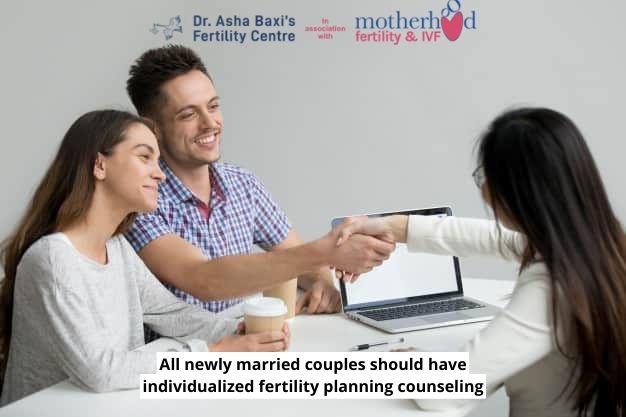Couples planning for a baby should have personalized fertility planning counseling to learn about the options for conception. Couples well in advance, say shortly after their marriage should be counseled on achieving a healthy weight and having an active lifestyle. They should also be counseled on the process, health factors and the financial costs of baby planning, delivery and post-delivery hospital essentials.
Few people realize that a person’s fertility declines with age. The older a woman is, the more likely she is to give birth to a baby with Down syndrome or other congenital problems. Older fathers are also more likely to father children with genetic abnormalities. There are a number of excellent fertility assessment and treatment options available. For example, there may be multiple assisted reproductive technologies (ART) options available for you to use during the procedure or cycle. Couples can then make an informed decision about their own family planning.
What is fertility counseling?
As fertility treatment is a complicated process, counseling provides an opportunity for couples to discuss any emotional difficulties, fears and anxieties that they may experience during the journey to becoming parents. Fertility counseling enables couples to be better informed of all circumstances involved with fertility treatment and make decisions accordingly.
Counseling also helps couples to discover, or re-discover, their hope for the future. The information found in fertility counseling can be overwhelming for some people and may help them to better understand their feelings and concerns surrounding the process of becoming parents. Ultimately, counseling helps people make good decisions following a difficult journey toward parenthood.
It may also support couples in understanding the process, especially during critical cycles, such as after unsuccessful IVF treatments or when it’s been successful but they find it hard to adjust. As couples undergoing IVF treatments need support, not just emotional but physical. They require additional care and attention to maintain their health.
When would I visit a fertility counselor?
- The needs of a couple seeking fertility counseling will depend on their ages, lifestyles, and future plans. If they’re considering starting a family in the next few years and are healthy, they may want to take action sooner rather than later. If they’re thinking about starting a family in the next few years but have health concerns or their lifestyle includes unhealthy habits, then they may want to work with a fertility specialist
- Before starting of the IVF treatment in indore, it is essential to learn about the issues leading to infertility and understand the possible treatment options. It can often get overwhelming to live with and even more so when it comes to making a decision about treatment options. It’s important for anyone who is struggling with infertility to learn about their options, as well as how to cope with the emotional and physical stresses of the process.
- Your doctor might suggest taking a break from IVF treatment if it has been unsuccessful so far. This will give you enough time to rest and allow the body to recover.
- Understanding the process of adapting to parenthood. Becoming a parent can be stressful and difficult. The transition from being single to having to share your life with another person (or persons) can be challenging. It is important for parents to learn how to adapt and create a balance between their personal needs and those of their children, so they are not neglecting one or the other.
Who can help with fertility counseling?
Couples are entitled to have sessions with their partner, individually or in a group, which depends on the needs, treatment and referral made by the consultant. Many clinics have fertility counselors and support groups for couples to talk to. They meet regularly and offer advice on setting realistic goals as well as linking them up with other helpful services if needed.
What causes infertility?
There are many causes of fertility problems and they affect both men and women. Women may experience ovulation issues, damage to the fallopian tubes, or endometriosis. Men will mostly have poor quality sperm on account of issues like infertility among other things. Other factors that could also affect fertility in both men and women are age, weight, sexually transmitted diseases (STDs), smoking, alcohol, and stress.
Why have fertility counseling?
Entering into parenthood is an exciting experience for those who want to start a family. It is important for these individuals to speak with a counselor who is trained in helping people cope with their emotions. A fertility counselor works with couples to provide guidance, support and assurance. They often speak about all the possible options that couples need to consider when trying to figure out what the decision is.
Thus, Fertility counseling is a process that helps individuals or couples struggling with infertility by providing them with information and tools. These sessions offer an opportunity for open communication, education, and support which is vital to the success of these treatments. A fertility counselor can give advice on how to improve their chances of conceiving by making changes to lifestyle and diet, as well as fertility-boosting medications. They can also help to pinpoint the time frame in which a pregnancy is more likely to occur.
Why is having a good fertility counselor important?
A good fertility counselor should have general medical knowledge, and be patient and compassionate. They should be able to offer you guidance on all aspects of fertility, including information about the treatment itself and advice on your lifestyle choices. They should have a lot of experience dealing with patients in similar situations so they can offer support and guidance. They should also be able to clearly communicate their ideas and opinions while not making their advice sound judgmental. And most importantly, they should be adequately trained and experienced, and understand the importance of confidentiality.

